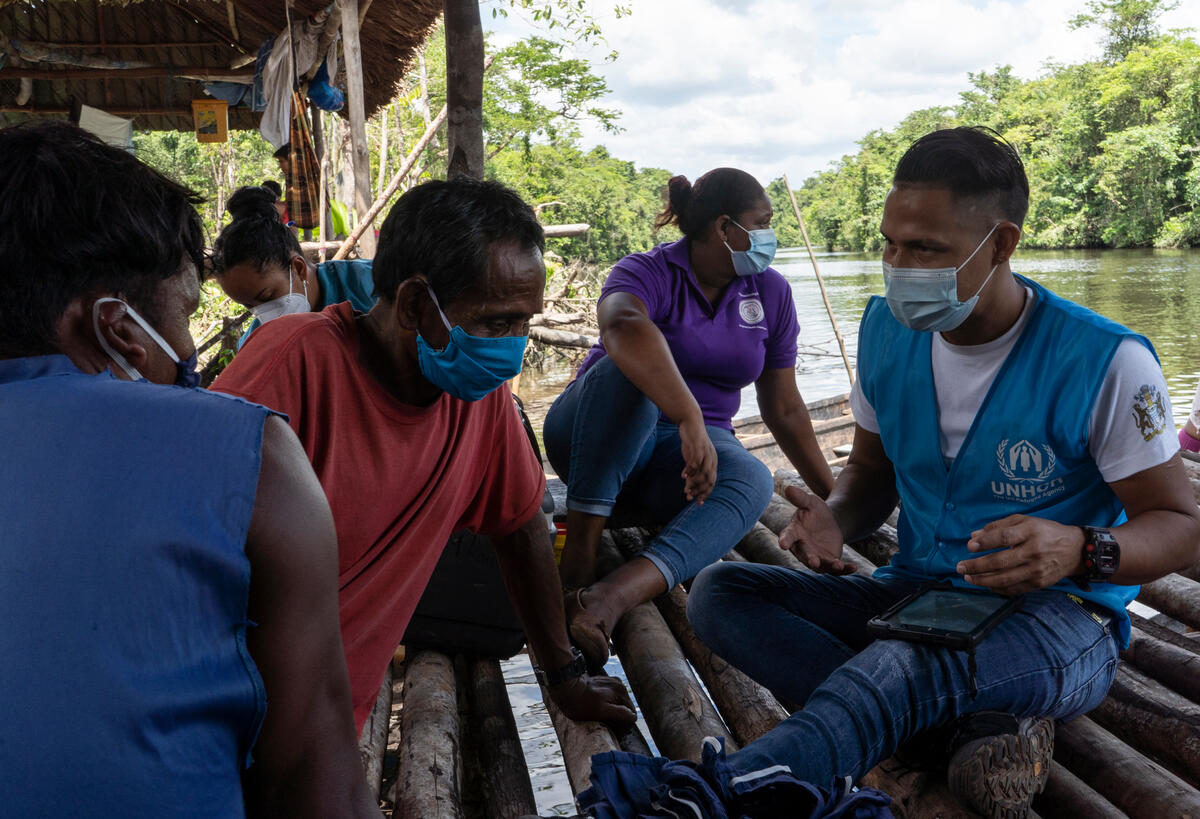As the COVID-19 crisis surges, refugee and local women support the COVID-19 response in Guyana
As the COVID-19 crisis surges, refugee and local women support the COVID-19 response in Guyana

For Daniela, sewing has always been a part of her life. Growing up in Barrancas del Orinoco, Estado Monagas, Venezuela, she taught herself to sew by hand at an early age and would make “Tapabocas”- a type of mask or mascarilla. So, when it came to making face masks as part of UNHCR, the UN Refugee Agency’s livelihood project to support Guyana’s response to the COVID-19 pandemic, it was second nature to he
“The COVID-19 pandemic has complicated my ability to work,” she stated. “This project is amazing, it keeps you busy and provides some stability, it makes me feel safe.”
Throughout Guyana, women like Daniela have stepped up to help handle the heavy public health strain the pandemic has placed on their communities. The mask livelihood project empowers the women by giving opportunities to provide for their families while supporting host communities in the fight against COVID-19.
Almost nine months into the pandemic, a “new normal” has emerged: frequently washing hands, observing social distancing, and wearing face masks when in public. This adjustment of social interaction has come with a sobering new reality: the restriction on movement and the slowdown of economic activity which has had a devastating impact on the ability of millions of people around the world to work and generate an income.
These economic and social hardships during the pandemic are what prompted UNHCR to develop the mask livelihood project. In coordination with the Civil Defence Commission of Guyana, which provided an initial donation of cloth, elastic, and thread, the help of local partners, and a generous contribution of 80 Singer sewing machines from the Church of Latter-Day Saints, the project has enrolled 80 participants and so far produced over 2,000 cloth masks, which have been distributed throughout rural Guyana. The project has been able to assist some of the most vulnerable women, while providing support to the Government’s pandemic response.
The mask livelihood project primarily targets women and survivors of sexual and gender-based violence (SGBV). While global estimates show that one in three women worldwide experiences SGBV at some point in their lives, in Guyana, that average is higher, with over 50% of women having experienced this type of violence at some point in their lives. Half of these women have never been able to safely seek help.
“Sexual and gender-based violence is a serious violation of human rights and a life-threatening health and protection issue. During a global pandemic, the threat of SGBV can significantly increase for women and girls due to loss of income and heightened protection risks,” said Cecilie Becker-Christensen Saenz Guerrero, Head of the National Office of UNHCR in Guyana.
“The production of face masks through this livelihood project is part of our commitment to responding to and preventing SGBV in Guyana. Not only does it provide the participating women a way to feed their families with the wages they earn, but it can also provide relief from unsafe situations as well as a way to give back to their host communities,” she continued.
The economic incentive provided by the UNHCR project has allowed Daniela to sustain herself throughout the pandemic.
For another participant, Sonia, a survivor of SGBV, the project has helped her stay in a safe environment. She did not have any sewing skills before participating in the mask livelihood project. After taking part in UNHCR’s training session, it is the first time in her life she is earning her own money from sewing, and she will be getting her first paycheck soon. For each face mask, she will receive 200 Guyanese dollars, the equivalent of 1 US dollar. Her income gives Sonia a new start to rebuild her life with dignity and provide her with long-term development skills for her future.
“The CDC salute the decision made by UNHCR to have community-based support in the production of the face mask that is in dire need during this pandemic,” said Loring Benons, Major Deputy Director General of the Civil Defense Commission in Guyana. “The fact that these masks were produced in the communities that were meant to be serviced was a great idea since the identified producers show much enthusiasm in getting the production done. Thus, the direct communities benefited.”
The 16 Days of Activism Against Gender-based Violence Campaign took place from 25 November to 10 December this year, intended to generate attention and mobilize action to prevent gender-based violence.




